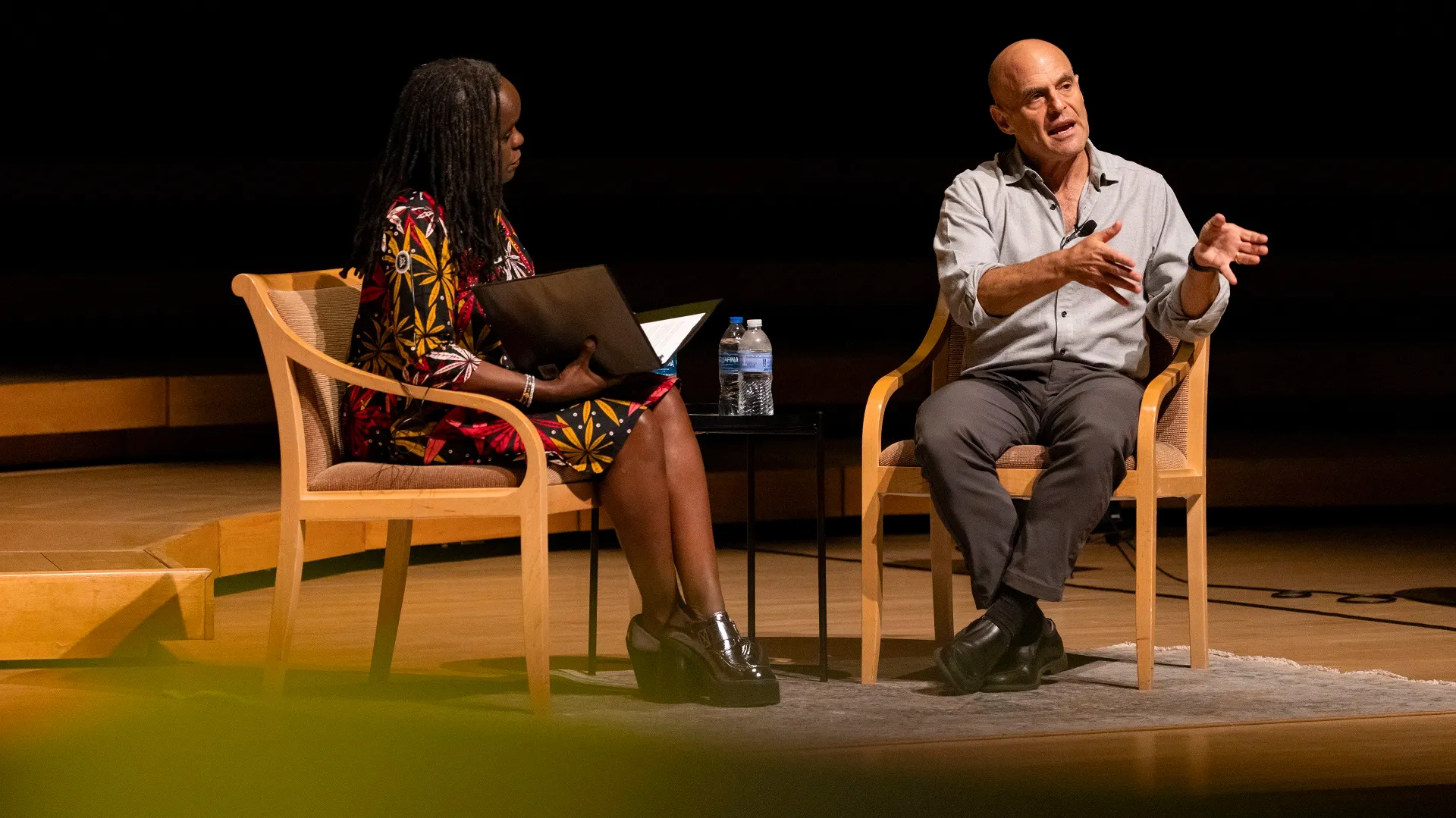- September 29, 2025
- By Lauren Brown
As the host of NPR’s news quiz show “Wait Wait … Don’t Tell Me!,” Peter Sagal gets to make a living poking fun at politicians and celebrities. On Friday evening at the University of Maryland, he gently teased Stephanie Shonekan about her fabulous shoes.
Eleventy inches high, mirrorlike and possibly iridescent, the pair worn by the College of Arts and Humanities dean grabbed the attention of Sagal after he sat down in The Clarice’s Dekelboum Concert Hall for the latest installment of the ARHU Dean’s Lecture Series.
“Does Elton John know they're missing?,” he asked.

He had the crowd laughing, nodding and applauding throughout their conversation, focused on the importance of the arts and humanities in difficult times.
“He shows us how politics, civics, humor and entertainment overlap to tell the story of the American experience,” said Shonekan, calling his show “the soundtrack of our weekend.”
Sagal has been a playwright, screenwriter, author, journalist, columnist and documentary host, among many other roles—even a magician's assistant. That’s besides hosting the irreverent weekly show, with its rotating cast of panelists and high-profile guests before a live audience, since 1998. He's interviewed icy rappers like Ice Cube and Ice T, and Clintons like Hillary, Bill and George, Shonekan deadpanned.
He was also an English major and a theater nerd in college. He had a lot to say about that in their conversation, in which he revealed what he’s learned in his education and career:
Freedom to fail builds confidence.
Despite his official academic focus, Sagal’s bigger interest was theater, but his college (Harvard, though he didn’t mention it) didn’t have a theater program at the time. Instead, students like him were given the opportunity and funds to put on shows with zero faculty oversight. “We failed in the most … extraordinary ways. Disasters of every kind. I myself once starred in a production of Henrik Ibsen's most boring play. Think about that.”
Once out in the real world, Sagal discovered that “you don’t get freedom to fail with no consequences … “ but those experiences gave me confidence, perhaps misplaced, to continue doing what I wanted to do as long as I could get away with it.”
The audience-artist relationship has unlimited possibilities.
Sagal recalled during college reading the novel “Pale Fire” by Vladimir Nabokov, which opens with a poem, then a commentary by an unreliable narrator. “I was so used to very straightforward narratives, and if the narrator said X happened, well then X happened.” This blew his mind, he said, and ever since he’s loved stories in which the telling of the story becomes part of the story.
“I've just been thrilled by the possibilities that occur between writer and reader and audience and performer, and that's probably why I ended up in the theater,” he said. “If they're in the same room, it's even that much more fun.”
The Constitution's power isn’t in the details, but the ideal.
Sagal wasn’t diverging from the main topics when he discussed traveling across the country to learn about the nation’s guiding governmental document (the focus of UMD’s 2025 First Year Book Program) for the 2013 PBS documentary series "Constitution USA.”
In it, he’s less the voice of authority—like biologist and broadcaster David Attenborough intoning on the march of the ants—and more as a student on an educational journey along with viewers. What he learned is this: “Nobody knows anything about the Constitution. Nothing. Nobody knows how it works. Nobody knows what's in it. Nobody knows the history of the various clauses or amendments or litigation or legal, you know, precedents that establish their meaning.”
But, Sagal said, almost everybody believes in it. “You don't need to know about the Commerce Clause to be a constitutional American. You just have to sort of generally believe in the rule of law, in settling disputes through legal or civic means rather than through violence.” He’s worried though, about whether the Constitution is safe in today’s political climate, when some extremists are questioning its tenets.
Radio—or at least audio entertainment—will always be around.
Sagal said that when TV came along, people thought it would be the death of film. Before that, critics said movies would ruin live theater. “That’s stupid. You need the art. Now, we don't care that much where we see it.” The same goes for radio, he said: Maybe pushing a button in your car to tune into a broadcast is falling out of fashion, “but audio will always be with us.” Nothing else provides “the intimacy of radio—the way of hearing and experiencing someone else's consciousness, whether that is presented via spoken word or music or poetry or sounds or whatever it may be. … It will always be needed and always be there and also probably always be doing something ultimately positive.”
This lecture was the public launch of the College of Arts and Humanities’ 2025-30 strategic plan, which affirms the essential role of the arts and humanities in addressing the urgent challenges of our time while charting a path toward a more just, creative and connected future. Learn more at arhu.umd.edu/about/arhu-strategic-plan.
Topics
Arts & CultureTags
Arts